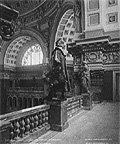Citation Information for “Baruch Spinoza,
‘Human Beings are Determined’”
Philosophical Ethics
November 6 2025 17:56 EST

Gallery of the Rotunda,
Library of Congress,
LC-D4-13499
Citation Information for “Baruch Spinoza,
‘Human Beings are Determined’”
This page is not intended to be original or authoritative. The page is a summary of some main points and associated notes on the topic. Undoubtedly, there are scholarly and authoritative sources, both primary and secondary which ought be cited rather than these notes.
However if you find the page of use, your citation should meet the style requirements of the publication for which you are submitting your paper. In general, the current page may be cited in this manner:
Archie, Lee C, "Baruch Spinoza, ‘Human Beings are Determined,’" Philosophical Ethics (July 12, 2006) URL=<http://philosophy.lander.edu/intro/spinoza.shtml>.
“Spinoza's argument is that when a man acts according to his wishes and desires, and hence does what he want to do without any external compulsion, he acts necessarily in the sense that his conscious desires are his reasons or sufficient conditions for doing what he does. Although it is true, in decision to act is not against our will, we do have free will. This does not mean, however, that our behavior has no reason or ‘cause’, and is free in the sense of having no explanation.”
S. Paul Kashap, Spinoza and Moral Freedom (New York: SUNY Press, 1987), 169.
Relay corrections or suggestions to philhelp@gmail
Read the disclaimer concerning this page.
1997-2025 Licensed under GFDL and Creative Commons 3.0


The “Copyleft” copyright assures the user the freedom to use,
copy, redistribute, make modifications with the same terms.
Works for sale must link to a free copy.
The “Creative Commons” copyright assures the user the freedom
to copy, distribute, display, and modify on the same terms.
Works for sale must link to a free copy.


